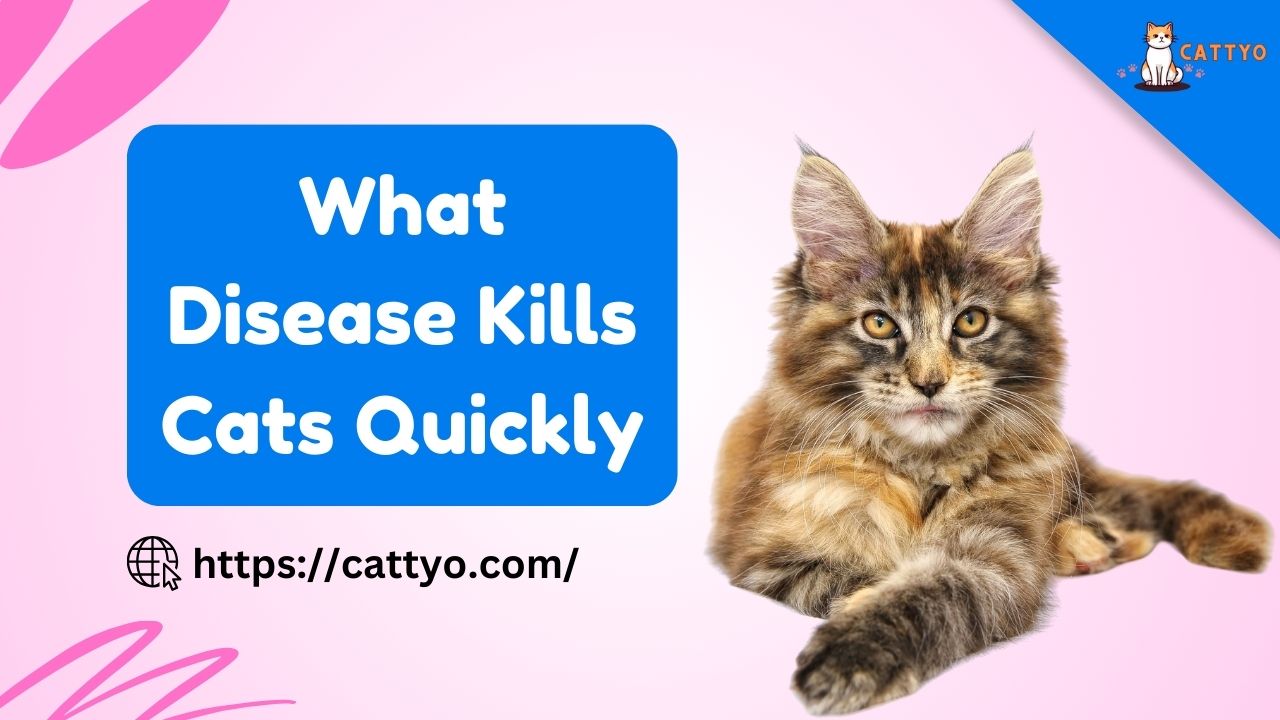Cats are beloved companions, often seen as mysterious and independent creatures who captivate us with their elegance and playful antics. But as cat owners, one of the hardest things to face is the possibility of illness.
Some diseases can strike unexpectedly and kill a cat quickly, leaving pet owners feeling helpless and devastated.
If you’ve ever asked yourself, What disease kills cats quickly?, you’re not alone. It’s a tough question, but knowing the answer can help you prepare, protect, and act swiftly in case your furry friend is at risk.
In this article, we’ll dive into the most common diseases that can kill cats quickly, their symptoms, causes, and what you can do to prevent them.
While some conditions are unavoidable, there are things every cat owner can do to keep their feline friend safe and healthy. So, let’s get started.
What Disease Kills Cats Quickly?
Cats can be susceptible to several aggressive and rapidly progressing diseases that can be fatal if not promptly diagnosed and treated.
Recognizing the signs of these life-threatening conditions is crucial for cat owners to seek immediate veterinary care, ensuring the best possible outcome for their feline companions.
Understanding these diseases, their symptoms, and preventive measures can significantly enhance your cat’s chances of survival and maintain their overall health.
Feline Panleukopenia (Feline Distemper): A highly contagious viral disease caused by the feline parvovirus. It attacks rapidly dividing cells in the body, leading to severe gastrointestinal symptoms, immune suppression, and often death if untreated.
- Symptoms: Sudden fever, vomiting, diarrhea (often bloody), dehydration, and lethargy.
- Prevention: Vaccination is highly effective in preventing this disease.
Feline Leukemia Virus (FeLV): A retrovirus that compromises the immune system, making cats more vulnerable to other infections and certain cancers. It can lead to chronic illness and death within months to years.
- Symptoms: Weight loss, anemia, persistent infections, and lethargy.
- Prevention: Vaccination and minimizing exposure to infected cats.
- Feline Immunodeficiency Virus (FIV): Similar to HIV in humans, FIV weakens the immune system, leading to increased susceptibility to various infections and diseases.
- Symptoms: Fever, swollen lymph nodes, mouth inflammation, and recurrent infections.
- Prevention: Keeping cats indoors and avoiding contact with infected animals.
Feline Infectious Peritonitis (FIP): A complex and fatal disease caused by certain strains of the feline coronavirus. It causes severe inflammation in various organs.
- Symptoms: Two forms exist—effusive (wet) form with fluid accumulation in the abdomen or chest, and noneffusive (dry) form with neurological or ocular symptoms.
- Prevention: Good hygiene practices and minimizing stress can reduce the risk, though no vaccine is universally effective.
Acute Kidney Injury (AKI): Sudden loss of kidney function can be caused by toxins (like antifreeze), infections, or severe dehydration. Without immediate treatment, AKI can be fatal within days.
- Symptoms: Increased thirst and urination, vomiting, lethargy, and loss of appetite.
- Prevention: Avoid exposure to toxins and ensure your cat stays hydrated.
Hypertrophic Cardiomyopathy (HCM): The most common heart disease in cats, where the heart muscle thickens, impeding normal heart function and leading to heart failure.
- Symptoms: Difficulty breathing, lethargy, sudden collapse, and heart murmurs.
- Prevention: Regular veterinary check-ups can help in early detection and management.
Respiratory Infections (e.g., Feline Herpesvirus, Feline Calicivirus): Upper respiratory infections can escalate quickly, especially in young or immunocompromised cats, leading to severe dehydration and secondary infections.
- Symptoms: Sneezing, nasal congestion, conjunctivitis, and ocular discharge.
- Prevention: Vaccinations and minimizing stress and exposure to infected animals.
Toxoplasmosis: A parasitic infection that can cause severe systemic illness, particularly in kittens and immunocompromised cats.
- Symptoms: Fever, lethargy, loss of appetite, and neurological signs.
- Prevention: Proper handling of cat litter, cooking meat thoroughly, and preventing hunting behaviors.
Toxic Poisoning: Ingestion of toxic substances like antifreeze, certain plants, human medications, or chemicals can lead to rapid deterioration and death.
- Symptoms: Vary depending on the toxin but often include vomiting, seizures, difficulty breathing, and sudden collapse.
- Prevention: Securely store all toxic substances out of your cat’s reach and be aware of household hazards.
Heartworm Disease: Although less common in cats than dogs, heartworms can cause severe respiratory and cardiac issues, often leading to sudden death.
-
- Symptoms: Coughing, difficulty breathing, vomiting, and lethargy.
- Prevention: Regular preventive treatments as recommended by your veterinarian.
Preventive Measures and Immediate Actions:
Regular Veterinary Check-ups: Routine examinations can help detect early signs of disease, ensuring timely intervention.
- Vaccinations:
Keeping your cat’s vaccinations up to date is critical in preventing many of these deadly diseases. - Proper Nutrition and Hydration:
A balanced diet and adequate water intake support overall health and immune function. - Safe Environment:
Minimizing exposure to toxins, infectious agents, and stressors can reduce the risk of disease. - Prompt Response to Symptoms:
If your cat shows any signs of illness, seek veterinary care immediately to increase the chances of survival.
By staying informed and proactive about your cat’s health, you can help protect them from these life-threatening diseases and ensure they lead a long, healthy life.
What Disease Kills Cats Quickly? A Look at the Most Dangerous Feline Illnesses
Cats, like humans, are susceptible to a variety of diseases, but some are more deadly than others. While some conditions develop gradually, others strike suddenly and can be fatal within days or even hours. Here are the most common diseases that can kill cats quickly:
1. Feline Leukemia Virus (FeLV)
Feline Leukemia Virus is one of the most serious viral infections in cats. FeLV affects the cat’s immune system, making them highly susceptible to other infections, cancers, and blood disorders. It’s often transmitted through saliva, nasal secretions, urine, feces, and milk.
Symptoms:
- Weight loss
- Poor coat condition
- Fever
- Anemia
- Enlarged lymph nodes
- Respiratory issues
Why is it so deadly? FeLV weakens the immune system, leaving cats vulnerable to secondary infections. It can lead to lymphoma (a type of cancer) and other severe conditions, which can kill the cat within months or even weeks if not treated.
How to protect your cat:
- Vaccination is available and should be a part of your cat’s regular health plan.
- Keeping your cat indoors can reduce the risk of exposure to infected animals.
2. Feline Infectious Peritonitis (FIP)
FIP is a viral disease caused by a mutation of the feline coronavirus. It can affect any cat, but young kittens and immunocompromised adult cats are especially at risk. The disease progresses rapidly and often leads to death within a few weeks to months after symptoms appear.
Symptoms:
- Fever that doesn’t respond to antibiotics
- Loss of appetite
- Weight loss
- Abdominal distension (due to fluid accumulation)
- Breathing difficulties
Why is it so deadly? FIP causes widespread inflammation in the body, particularly in the liver, kidneys, and central nervous system. Once the disease reaches an advanced stage, there is no cure, and it can be fatal.
How to protect your cat: There is no widely available vaccine, though there have been advancements in treatment. Keeping your cat indoors can help reduce the spread of the virus.
3. Rabies
Rabies is a viral infection that attacks the nervous system and is almost always fatal. It’s a well-known disease that affects both animals and humans. While rabies is rare in cats, it can still occur, especially if they are allowed to roam outdoors and come into contact with wild animals.
Symptoms:
- Behavioral changes (aggression, disorientation)
- Paralysis (especially in the throat and jaw)
- Drooling
- Seizures
- Difficulty breathing
Why is it so deadly? Once the symptoms of rabies appear, the disease progresses rapidly and is almost always fatal. Rabies attacks the brain, causing irreversible neurological damage.
How to protect your cat:
- Rabies vaccination is required by law in many areas.
- Keep your cat indoors and avoid exposure to wild animals.
4. Heartworm Disease
Though more common in dogs, cats can also get heartworms. This disease is transmitted through mosquito bites and affects the cat’s heart and lungs. While it may not be as commonly recognized in cats, it can cause severe damage and, in some cases, be fatal.
Symptoms:
- Coughing
- Vomiting
- Weight loss
- Lethargy
- Sudden collapse or death
Why is it so deadly? Heartworms cause severe damage to the lungs, heart, and blood vessels, leading to organ failure. In severe cases, the worms can cause sudden death, particularly if they block the heart’s function.
How to protect your cat:
- Monthly heartworm preventatives (available through your vet) can help protect cats.
- Keeping cats indoors reduces exposure to mosquitoes.
5. Acute Kidney Failure
Kidney failure is another disease that can kill cats quickly. It can be caused by a variety of factors, including toxins, infections, or even certain medications.
Symptoms:
- Loss of appetite
- Vomiting
- Lethargy
- Increased thirst and urination
- Poor coat condition
Why is it so deadly? Kidneys filter waste from the bloodstream, and when they fail, toxins build up, causing poisoning. Acute kidney failure can occur suddenly and is often fatal without prompt medical intervention.
How to protect your cat:
- Regular vet check-ups and blood work can catch early signs of kidney issues.
- Avoid exposure to toxins such as antifreeze, certain plants, and chemicals.
6. Feline Distemper (Panleukopenia)
Feline distemper, also known as panleukopenia, is a highly contagious viral infection that attacks the cat’s intestines, immune system, and nervous system. This disease can kill a cat in just a few days if untreated.
Symptoms:
- High fever
- Vomiting
- Diarrhea
- Dehydration
- Weakness
- Abdominal pain
Why is it so deadly? Feline distemper destroys white blood cells, weakening the immune system and making the cat highly vulnerable to secondary infections. The virus also damages the gastrointestinal tract, leading to severe dehydration and malnutrition.
How to protect your cat:
- Vaccination is the most effective way to protect cats from panleukopenia.
- Keep your cat indoors and avoid contact with potentially infected animals.
What Can You Do to Protect Your Cat from Quick-Killing Diseases?
As a responsible cat owner, it’s important to take proactive steps to safeguard your cat from these deadly diseases. Here are some general strategies for ensuring your cat stays healthy and safe:
1. Regular Vet Check-Ups
Taking your cat to the vet for regular check-ups is essential for early detection of any potential health problems. Many of the diseases mentioned above can be treated or managed if caught early.
2. Vaccinations
Vaccines are one of the most effective ways to protect your cat from serious diseases. Ensure that your cat is up-to-date on core vaccines such as the rabies vaccine and the feline distemper vaccine.
3. Keep Your Cat Indoors
Cats that roam outdoors are at a higher risk of contracting diseases like rabies, feline leukemia, and heartworms. Keeping your cat indoors minimizes exposure to dangerous diseases.
4. Maintain a Healthy Diet and Hydration
A balanced diet and access to clean water are essential for maintaining your cat’s overall health. Poor nutrition can weaken the immune system, making cats more susceptible to infections.
5. Be Aware of Toxic Substances
Keep harmful substances like antifreeze, certain plants, and human medications away from your cat. Many toxins can cause kidney failure or other severe illnesses.
6. Spay or Neuter Your Cat
Spaying or neutering your cat reduces the risk of certain health problems, including reproductive cancers and infections. It also prevents unwanted litters, contributing to overall community health.
FAQs About What Disease Kills Cats Quickly
Q: Can FIP be cured?
A: Unfortunately, there is no cure for FIP, although research is ongoing, and some antiviral treatments have shown promise in extending life in some cases.
Q: Is heartworm disease common in cats?
A: Heartworm disease is less common in cats than in dogs, but it can still be deadly. Monthly prevention is the best defense.
Q: Can rabies be transmitted to humans?
A: Yes, rabies is zoonotic, meaning it can be transmitted to humans. This is why vaccinating your pets is so important.
Final Words
Losing a cat is never easy, especially when it’s to a disease that strikes unexpectedly. While many illnesses can affect our feline friends, understanding the ones that can kill cats quickly helps us be more prepared and proactive in protecting them.
From the devastating effects of Feline Leukemia Virus and FIP to the sudden onset of heartworm disease or kidney failure, there are several threats to be aware of.
The good news is that with regular vet check-ups, vaccinations, and a few precautionary measures—like keeping your cat indoors and avoiding toxic substances—you can significantly reduce the risk of your cat falling victim to these deadly diseases. Early detection is key, and being mindful of your cat’s behavior and health can make a world of difference in catching problems before they escalate.
Your cat’s health is in your hands. By taking the necessary steps to protect them, you can help ensure they live a long, happy life full of purrs and playful moments. Stay informed, stay vigilant, and always seek professional veterinary advice if you’re concerned about your cat’s health.
Your furry friend deserves nothing less than the best care—after all, they are more than just pets; they’re family.





